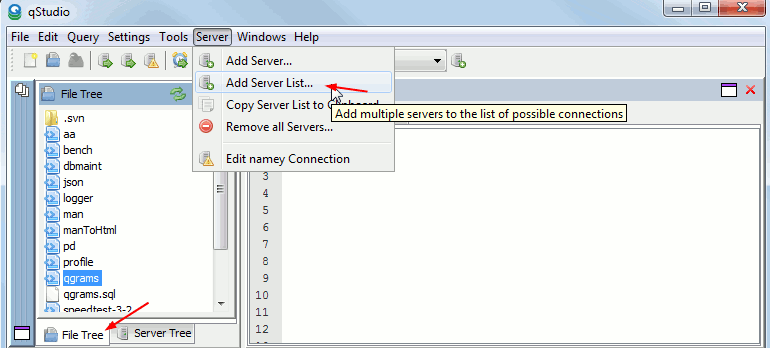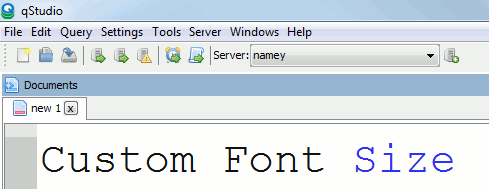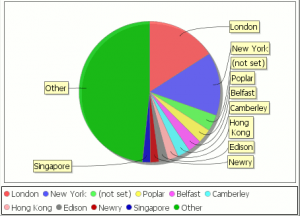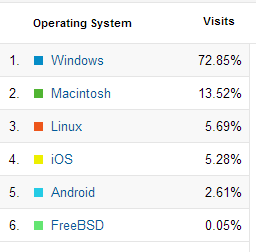March 27th, 2013 by admin
q Code File Browser and Adding Multiple Kdb Servers

Added IDE Features:
- Add File Tree that allows browsing directory and providing autocomplete
- qDoc supports custom user tags (Thanks Aaron)
- Allow adding/exporting whole lists of servers at once (much quicker)
- Installers are now signed.
- Ctrl-D “goto definition” of function to open that file/position
- (PRO) Unit Testing and function profiling partially integrated.
March 27th, 2013 by admin
Added qStudio Features:

- Faster chart drawing (~1.6x faster)
- Added No Redraw chart option for those who want extra speed
- Numerous bugfixes to charts that froze
- Allow setting code editor font size
- Fix display of boolean/byte lists
March 20th, 2013 by admin
Speakers Included:
Interesting fun talk on finding the highest correlated streams among thousands of streams extremely efficiently by comparing streams against random generated data rather than exhaustively against each other. Followed up by pattern detection over different time windows efficiently which I think is this paper: .
Aaron Davies – (dis-)functional select and de-queueing bugs
Slides available here.
To those that have ever been forced to write functional selects, the shortcut notation allows a much more readable form.
Joe Landman – Performance vs. IO & Memory etc.
A topic I find extremely interesting, unfortunately the material was probably too densely packed and I couldn’t follow along well. Hopefully the slides will be released so I can get the details at my own pace. Joe has a great blog http://scalability.org full of high performance articles.
Multithreaded slaves as standard – start kdb with an overridden -s and you can run separate kdb processes on different parts that will each perform part of the query. Standard slaves with par.txt were proving less worthwhile especially for SSD’s. Curious to see how this will compare to mserve.
-23! – optimise reading entire tables by mapping them in all at once. Really I want this to happen automatically (query optimizer please) but I guess we have to be happy with the faster speed.
discussion panel: “Components, Frameworks and Nifty Internal Tools – The Good, Bad and Ugly?”
Ed Bierly
Igor Kantor, BAML
Nate McNamara, Morgan Stanley
At times everyone seemed to agree their frameworks were good but others were questionable. Interesting to me was questioning from the audience on creating an open source library of kdb tools…
March 20th, 2013 by admin
On TimeStored we monitor visitor statistics, so assuming that most visitors are going to work in kdb this gives us insight into where kdb consultants/developers are located, what OS/browser they use and how long they spent on the site. For example:

kdb locations
If you work in kdb your probably underneath a dot on this map.
 Kdb Developers by Country |
 Kdb Developers by City |
We can see if you work in kdb your probably located in either the UK or US, mostly London or New York. It’s interesting to see Belfast and Newry show up but easily explained as First Derivatives HQ is in Newry and both Citi and First Derivatives have offices in Belfast with kdb staff.
Now that we have seen where kdb developers are located let’s consider what OS/browser they use:
 Kdb Developer Attention Span |
 kdb developer web browsers |
 kdb user operating systems |
UK users spent 1 minute longer on the site than their US counterparts 🙂 Though this could partially be explained by the site being more responsive in the UK as the hosting was based there.
Surprisingly (to me) chrome was the number one browser and someone was using freebsd!







